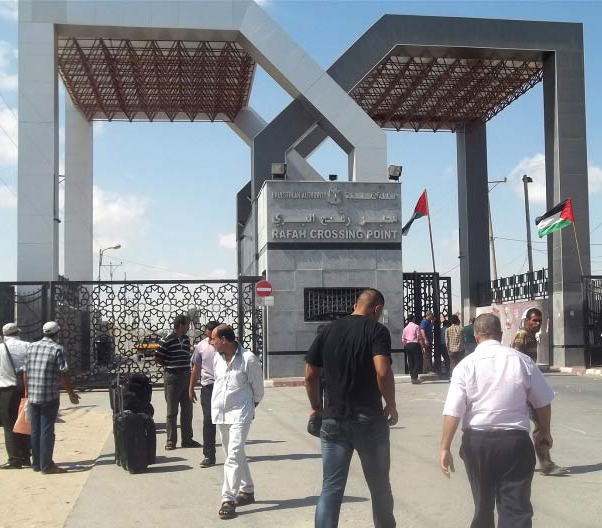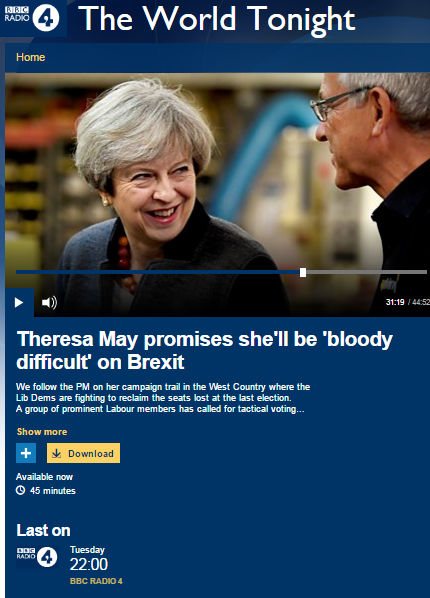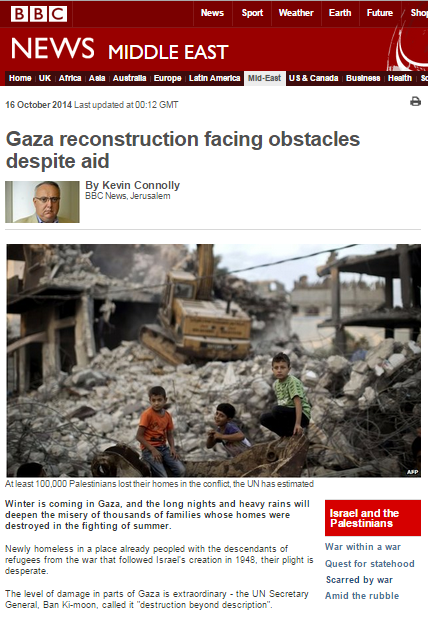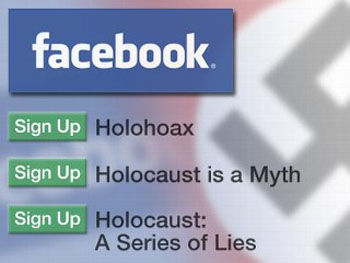As we have seen, a significant proportion of the January 18th edition of BBC Radio 4’s ‘Today’ programme was given over to two items relating to Israel and the Gaza Strip. The second of those items was discussed here:
BBC Radio 4’s ‘Today’ on the Gaza Strip – part one
BBC Radio 4’s ‘Today’ on the Gaza Strip – part two
We have also looked at one aspect of presenter Mishal Husain’s introductions to both those items:
BBC’s Mishal Husain fosters a narrative with airbrushed statistics
The first item began (from 37:13 here) with an opaque reference to a new political party running in the upcoming general election in Israel – but without listeners being told even the party leader’s name – and yet more euphemistic portrayal of the ‘Great Return March’ violent rioting as “protests”.
Husain: “A former Israeli military chief has launched a bid to challenge Benjamin Netanyahu in the elections scheduled for April. They’ll come a year after weekly Palestinians protests at the boundary fence between Israel and Gaza began. The UN says that last year 295 Palestinians were killed and 29,000 injured by Israeli forces in the West Bank and Gaza – the highest annual figure since 2014. Fifteen Israelis were killed in Palestinian attacks in the same period. Tom Bateman, our Middle East correspondent, is on the line from Jerusalem and in this coming election campaign, Tom, how much will relations with Palestinians and security feature?”
As BBC reporting on past Israeli elections shows, the corporation has repeatedly promoted the notion that the ‘peace process’ was the most important issue facing the Israeli electorate even when that was patently not the case.
“The most outstanding characteristic of BBC reporting on the 2015 Israeli election from day one was the insistence of its journalists on framing the story from the angle of its effect on negotiations with the Palestinians – despite the fact that other concerns were much higher up on voters’ lists of priorities. So, whilst BBC audiences heard or read occasional brief references to ‘economic issues’, ‘the cost of living’ and ‘house prices’, they were never actually provided with any in-depth background information on those topics and hence were incapable of appreciating why – for example – a previously non-existent party (Kulanu) won ten seats in the incoming Knesset.”
If this item is anything to go by, the BBC has obviously not abandoned that redundant framing. A prominent politics journalist at the Jerusalem Post notes that:
“The Palestinians, peace talks, and settlements seem to be almost entirely irrelevant to this election season.”
Bateman began by airbrushing Hamas’ violent take-over of the Gaza Strip nearly 12 years ago and whitewashing the background to “the conflict between Israel and Hamas”.
Bateman: “Well it will play a role…ah…but I think that the degree to which it’s decisive or significant will very much depend on what happens really on the ground, particularly in relation to the conflict between Israel and Hamas which runs Gaza. And also in terms of the sort of rhetorical situation that you’ll hear Mr Netanyahu talk about a lot in terms of the most strategic threat that he sees which is from Iranian entrenchment, Iranian forces inside…ah…neighbouring Syria. Now on that front there’s been, you know, a significant move in the fact that President Trump has said that US troops will be withdrawn. That is very concerning for Israel but you’re not gonna hear it publicly from Mr Netanyahu who has made a relationship with President Trump key in a priority to his…ehm…diplomatic focus. In terms of what the polls are saying, well despite the situation that we’ve had with Mr Netanyahu; people in his right-wing coalition trying to portray him as being too weak when it comes to Gaza – the more hawkish elements of his cabinet and his defence minister Avigdor Lieberman resigned late last year over this – despite all that the polls still suggest his Likud party’s on course to be again the biggest party, could even gain seats and that it is likely then that he will be able to put together another right-wing coalition.”
Husain: “And on this point about the conflict with Hamas I mean those casualty figures, a big part of them is what’s been going on in Gaza and it…you know you might say it can’t go on like that, it’s not sustainable and yet it has for many months and we reported from there last month.”
Failing to clarify that “the health ministry in Gaza” is the same terror group behind the weekly violent rioting at the border, Bateman went on to make a context-free reference to an earlier incident.
Bateman: “Yeah and I think the protests at the fence every Friday show few signs of going away. Just last Friday another 14 year-old boy was shot and died later of his wounds according to the health ministry in Gaza. However, the numbers have reduced since the peak of the protests in the spring and summer of last year.”
What Bateman and Husain describe as “protests” included the following on that day:
“About 13,000 Palestinians participated (10,000 last week). The demonstrators gathered at a number of locations along the border. During the events there was a high level of violence, which included burning tires as well as throwing stones, IEDs and hand grenades at IDF soldiers and at the security fence. In the northern Gaza Strip there were at least three attempts to break through the fence into Israeli territory. In one instance IDF forces fired shots at suspicious Palestinians who fled back into the Gaza Strip. One IDF soldier was slightly injured by a stone.”
Downplaying of the violence that has included hundreds of incidents of rocket attacks against Israeli civilians, Bateman continued:
Bateman: “There’s been a series of military escalations between Hamas and Israel. Now whether or not that will flare up again I think could have a significant impact on the election process. It may conversely be inspired to some degree by the fact that there are elections in Israel. But what the Israeli prime minister or the tack he has chosen is to try to take a bit of political damage from his own right-wing…from the more hawkish elements and try to contain that situation. That is in the form of a very indirect arrangement brokered by the Egyptians, by the Qataris and by the UN in which the Israelis effectively asked for calm on the perimeter fence. In return Hamas – which is under significant pressure financially because of the Israeli and Egyptian blockade, because of sanctions by the internationally recognised Palestinian leadership too…eh…there are suitcases full of cash – millions of dollars – coming from Qatar into Gaza to pay civil servants’ salaries and also to prevent a collapse of the electricity supply in Gaza. Now that is being permitted by Benjamin Netanyahu. The third payment of $50 million was postponed last week which shows I think just how very fragile this sort of uneasy truce is.”
Bateman failed to inform listeners that those “civil servants” are employees of the Hamas terror organisation or that the reason for the postponement of that “third payment” was a rise in violence that included more rocket attacks that went unreported by the BBC.
While the BBC has not yet produced much reporting on the upcoming election in Israel its framing of that topic so far is just as inflexible and unhelpful to audiences as its framing of almost ten months of weekly violent rioting and border infiltrations which it persists in portraying as “protests”.
Related Articles:
Reviewing the BBC’s record of reporting on Israeli elections
BBC Radio 4’s ‘Today’ on the Gaza Strip – part two
BBC Radio 4’s ‘Today’ on the Gaza Strip – part one
BBC’s Mishal Husain fosters a narrative with airbrushed statistics




